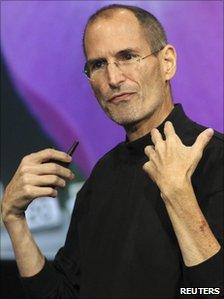Apple makes record profits of $6bn in last three months
- Published

Mr Jobs is credited with turning around the fortunes of the company
Apple made record profits and record revenues in the run-up to Christmas as shoppers bought more Macs, iPhones, and iPads than analysts predicted.
The company said that in the three months to 25 December, net profit was $6bn (£3.7bn) on revenues of $26.74bn.
Steve Jobs, Apple's chief executive, said in a statement: "We had a phenomenal holiday quarter."
There was no further mention of his health problems following Monday's news that Mr Jobs is taking medical leave.
While he is continuing as chief executive and will be involved in any major decisions, day-to-day running has passed to chief operating officer Tim Cook.
Apple's first-quarter profit is a 71% jump on the same period last year.
Daniel Ernst, analyst at Hudson Square Research, said: "Apple blew away earnings expectations, again. It seems to be a recurring event for these guys.
"It was across the board, top to bottom, another great quarter," he said.
The company sold 4.13 million Macs during the quarter, a 23% rise year-on-year, and 16.24 million iPhones, a leap of 86%.
iPod sales fell 7% to 19.45 million units. Apple sold 7.33 million iPads.
Shares in the company, which had fallen during the day, rose 4% in after-hours trading to about $354.
News of Mr Jobs' latest health problems came on a US public holiday, when financial markets were closed.
When markets re-opened on Tuesday, the shares immediately fell as much as 6%, but eventually closed down 2.2% in official trading.
The California-based company said that 62% of its revenues came from outside the US. In the Asia-Pacific market, which includes China, Apple said revenues almost tripled.
Medical history
Some analysts are concerned about what Mr Jobs' absence from Apple might mean for the company's future, as he has become inextricably linked with its success.
In his statement on Tuesday, Mr Jobs was very upbeat about the Apple's future. He said: "We are firing on all cylinders and we've got some exciting things in the pipeline for this year".
Despite Mr Jobs' previous ill health, the company's stock market value has approximately quadrupled in the past two years.
In late 2008 to mid-2009, Mr Jobs was absent from Apple for six months to have a liver transplant.
It was part of a series of treatments he has undergone for pancreatic cancer. He was first diagnosed in 2004 and underwent surgery later that year to remove a tumour from his pancreas.
"US investors are concerned about his absence," says Yair Reiner, stock analyst at New York investment firm Oppenheimer & Co.
"But the ups and downs of his health over the last couple of years have allowed investors to partly discount his departure into the price of their shares."
In an e-mail to staff, Mr Jobs said he would be back at work as soon as he could.
The letter "leaves everything to the imagination" said Mr Reiner, adding that the company had provided no guidance as to whether it would be a short break or the prelude to a permanent departure.
Mr Cook has run the company in the past during Mr Jobs' absence.
According to Mr Reiner, markets have a lot of confidence in the management abilities of Mr Jobs' stand-in, although he has not yet had the opportunity to demonstrate whether he can provide the same visionary leadership as his boss.
Mr Jobs' health issues come as Apple is rumoured to be preparing to launch the second version of its iPad - the successor to the tablet computer it launched in 2010.
With the product line-up for the next two to three years already set, Mr Reiner said that the real impact of a permanent departure of the Apple head would only be felt some years down the line.
- Published25 August 2011
- Published18 January 2011
- Published18 January 2011
- Published17 January 2011
- Published17 January 2011